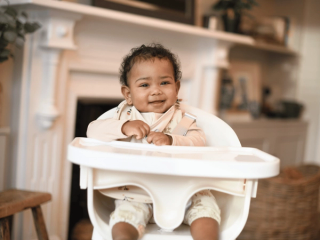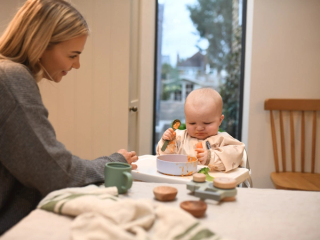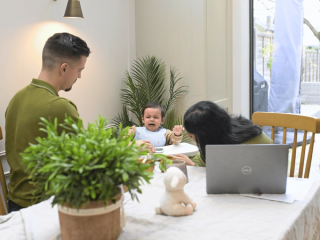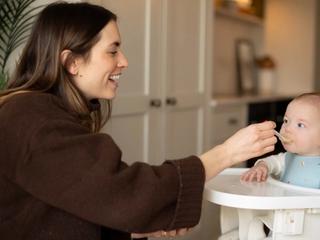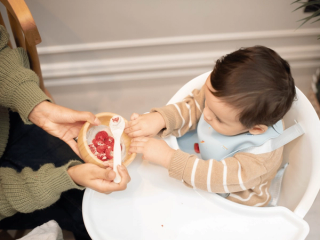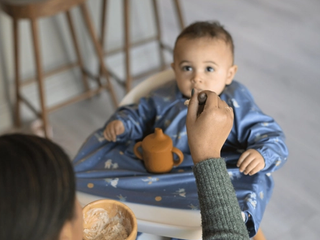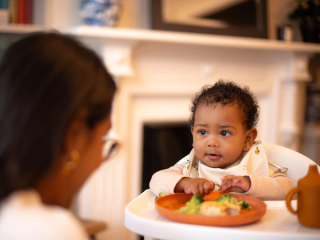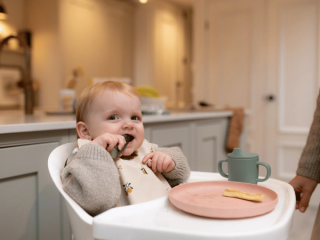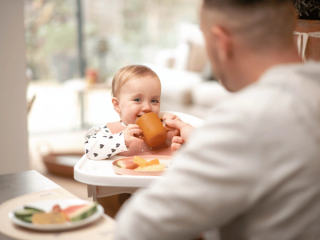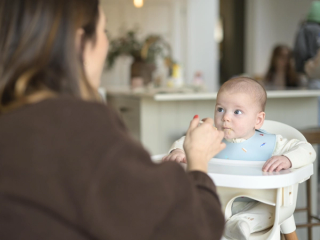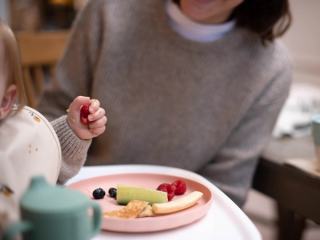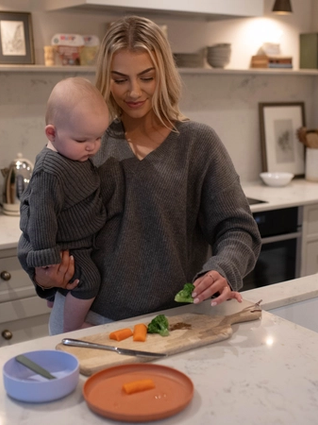
- Home
- Advice Hub
- Baby
- Weaning
- Vegan & Vegetarian Weaning Guide
Weaning a baby on a vegetarian or vegan diet
Get tips on weaning your baby on a vegetarian or vegan diet, with guidance on essential nutrients, meal ideas, and advice for a balanced start to solid foods.
Over the past few years, increasing numbers of people have moved towards eating vegetarian and vegan diets, which means more parents are weaning their babies in this way. Whether this decision is driven by concerns over animal welfare, the environment or health, new parents may find themselves searching online for suitable vegan baby food, for information on vegetarian weaning or vegan weaning.
If that sounds like you, we’ve got you covered with our go to guide.
What is a plant based diet?
So, what are we talking about here? Plant based diets can range from people who are simply trying to cut down on meat consumption and adding some vegetarian meals into their week all the way through to people who follow a strict vegan diet. A vegan diet contains no foods derived from animals including meat, fish, dairy, eggs and honey.
For the rest of this article, we will be focusing mainly on vegan diets.
Can babies thrive on a vegan diet
The short answer is: yes, they can.
The longer answer is: yes, with some careful planning to ensure that all nutritional needs are met (but that is the same for any baby, whether they are vegan or not!) If you plan to raise your baby vegan, it is helpful to get advice from a paediatric dietitian to ensure you are giving all of the right foods to meet your baby’s needs.
As with any diet, variety is key; offering a range of fruits, vegetables, grains, dairy alternatives and proteins ensures that your baby gets all the nutrients they need.
The British Dietetic Association and the NHS both support well thought out vegetarian and vegan diets, you can find more information from them here:
What are the main vitamins and minerals to be aware of?
When considering which nutrients you need to be aware of, it will really depend which foods you are cutting out, as there is a huge difference between lowering your meat intake and eliminating all animal products.
If you are vegetarian; the main points to consider are that there is really nothing in meat that you cannot get elsewhere; iron and zinc (mentioned below) can be easily replaced. Omega 3 which we predominantly consume in the form of oily fish in the UK should also be considered if all fish is excluded.
If your baby is going to be fully vegan, you will need to consider all the nutrients mentioned below as they are critical for healthy growth and development, and some can be more challenging to obtain from plant-based foods alone.
Iron: Iron is important for your baby’s brain development and immune function. Include iron-rich plant foods like lentils, chickpeas, tofu, spinach, and fortified (this means nutrients have been added) cereals at every meal. Pair these foods with vitamin C-rich options like strawberries, oranges, or peppers to help your baby absorb plant-based iron more efficiently.
Zinc: zinc is essential for immune function and for healthy growth in children. Try to include foods like legumes, seeds, nuts, whole grains, and fortified cereals.
Iodine: Iodine is essential for thyroid function. Most of the iodine we eat in the UK comes from seafood and dairy, so babies on a vegan diet will need to eat fortified foods, such as plant-based milk and cereals. When using a plant-based milk you should give it a really good shake before you use it as all the added nutrients sink to the bottom.
Calcium: This mineral is vital for building healthy bones during the whole of childhood and adolescence. Good sources of calcium include fortified plant-based milk (soya and oat are good options), calcium set tofu, leafy greens and fortified hot oat cereals. Aim for 2-3 portions of calcium rich dairy alternatives daily.
Vitamin B12: Is only really found in animal products, and is essential for nerve function and the production of red blood cells. If cutting out all animal products you will need to give fortified foods such as plant-based milk, nutritional yeast, spreads and cereals, or by giving a daily supplements (see below).
Vitamin D: OK, so this one isn’t strictly about vegan diets; but it’s still important to mention. Vitamin D supports bone health and immune function, and we cannot get much from our diet as it is a hormone made by the kidneys when sunlight hits our skin during the summer months.
Omega-3 Fatty Acids: These healthy fats are crucial for brain and eye development. Plant based options include flaxseeds, chia seeds, hemp seeds, and walnuts. Try to include omega 3 fats everyday as it is more difficult to absorb plant-based sources than fish and if that is not possible you can try an algae supplement.
Protein: Parents often worry about protein on a vegetarian or vegan diet, but in the UK children are eating on average about three times as much protein as they need. Include lentils, chickpeas, smooth nut butters, quinoa, tofu, peas and other protein rich foods to ensure your baby gets enough protein.
Does my child need supplements when on a vegan diet?
When assessing whether your child needs a supplement it is always good to consult a healthcare professional. In some cases, supplements are recommended to ensure your baby is getting the full range of nutrients required for healthy growth. But other than the ones mentioned below, if your little one is eating a good range of foods they may not need one.
- Vitamin B12: If your child isn’t consuming enough fortified foods, a B12 supplement will likely be necessary. It is often a good idea, if following a vegan diet to give a B12 supplement to ensure your child is covered.
- Vitamin D: The NHS recommends that all children, regardless of their diet, take a vitamin D supplement year round until age four (unless drinking more than 500ml of formula) and through the winter from 5 years.
- Iron: Although plant-based iron sources can be adequate, if your baby shows signs of low iron (such as fatigue, reduced appetite or pale skin), an iron supplement might be advised by your healthcare provider.
Plant-based weaning foods
With all of that in mind; here are a some example meals to show the types of meals you can offer that contain a range of nutritious plant based foods:
Day 1:
- Breakfast: Porridge made with fortified oats and plant-based milk with added calcium & iodine. Topped with mashed banana and a sprinkle of ground flaxseed and chia seeds.
- Lunch: Lentil puree mixed with cooked, mashed sweet potato served with broccoli florets and a slice of wholemeal toast.
- Dinner: Tofu and vegetable stir-fry with soft-cooked tofu and a variety of vegetables like carrots, spinach, and peas. Served with quinoa or couscous.
- Dessert: Rice pudding made with fortified milk
- Snack (if over a year): Hummus on cucumber sticks
Day 2:
- Breakfast: Smoothie made from fortified plant-based milk, frozen berries and a spoonful of flaxseed. Soft, mashed avocado on wholegrain toast.
- Lunch: Chickpea mash or hummus mixed with tahini, paired with soft-cooked carrot sticks. Served with mashed butternut squash and wholegrain rice.
- Dinner: Quinoa and vegetable stew with a spoonful of nutritional yeast mixed in.
- Dessert: Fortified soy milk with fruit
- Snack/pudding: Fruit puree made from apples and pears served with fortified soya yoghurt.
Hopefully this article has helped to reassure you that with careful planning and a diverse range of foods, children can absolutely thrive on a vegan or vegetarian diet. In fact, a vegan or vegetarian diet can be like any other diet should be – enjoyable and delicious for your little one! If you aren’t sure whether your little one is getting enough of the right nutrients, having their diet assessed by a trained professional is a great way to ensure there’s no nutritional gaps or potential deficits.
